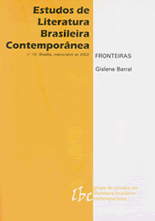Fronteiras:
correspondências entre espaços físicos e psicológicos liminares em O exército de um homem só, de Moacyr Scliar, e Armadilha para Lamartine, de Carlos & Carlos Sussekind
Resumo
Fronteiras: correspondências entre espaços físicos e psicológicos liminares em O exército de um homem só, de Moacyr Scliar, e Armadilha para Lamartine, de Carlos & Carlos Sussekind
Downloads
Referências
ARENDT, Hannah. Origens do totalitarismo. Trad. de Roberto Raposo. São Paulo: 37 Companhia das Letras, 1989.
BACHELARD, Gaston. A poética do espaço. Trad. de Antônio da Costa Leal e Lídia do Valle Santos Leal. Rio de Janeiro: Livraria Eldorado Tijuca, [s.d.].
BACHELARD, Gaston. El agua y los sueños: ensayo sobre la imaginación de la materia. Trad. de Ida Vitale. México: Fondo de cultura económica, 1978.
BACHELARD, Gaston. A poética do devaneio. Trad. de Antônio de Pádua Danesi. São Paulo: Martins Fontes, 1996.
BAL, Mieke. Introduction to the theory of narrative. Trad. de Christine van Boheemen. Canadá: University of Toronto Press, 1985.
BENJAMIN, Walter. A modernidade e os modernos. Trad. de Heindrun Krieger Mendes da Silva et al. Rio de Janeiro: Tempo Brasileiro, 1975.
BERGER, Peter. Perspectivas sociológicas uma visão humanística. Trad. de Donaldson M. Garschagen. Petrópolis: Vozes, 1978.
CARVALHAL, Tânia. Augusto Meyer: poesia, prosa e ensaio. Porto Alegre: Instituto Estadual do Livro, 1987
CERTEAU, Michel de. A invenção do cotidiano, 2 vols. Trad. de Ephraim Ferreira Alves. Petrópolis: Vozes, 1994.
CHEVALIER, Jean; GHEERBRANT, Alain. Dicionário de símbolos. Trad. de Vera da Costa e Silva et al. Rio de Janeiro: José Olympio, 1991.
CIRLOT, Juan-Eduardo. Dicionário de símbolos. Trad. de Rubens Eduardo Ferreira Frias. São Paulo: Moraes, 1984.
COOPER, David. A linguagem da loucura. Trad. de Wanda Ramos. Lisboa: Presença, 1978.
D’ANDREA, Flávio Fortes. Transtornos psiquiátricos do adulto. São Paulo, Difel, 1982.
DUROZOI, Gérard e LECHERBONNIER, Bernard. O Surrealismo: teorias, temas, técnicas. Trad. de Eugênia Maria Madeira Aguiar e Silva. Coimbra: Almedina, 1972.
FOUCAULT, Michel. História da loucura na Idade Clássica. Trad. de José Teixeira Coelho Netto. 3ª ed. São Paulo: Perspectiva, 1991.
FRAYZE-PEREIRA, João Augusto. O que é loucura. São Paulo: Brasiliense/Abril Cultural, 1985.
GOFFMAN, Erving. Estigma: notas sobre a manipulação da identidade deteriorada. 4ª. ed. Trad. de Márcia Bandeira de Mello Leite Nunes. Rio de Janeiro: Guanabara Koogan, [s. d.]. Enciclopédia, 1967.
KAFKA, Franz. Carta a meu pai. Trad. de Torrieri Guimarães. 5ª. ed. São Paulo: Hemus, 1970.
KRISTEVA, Julia. O texto do romance. Trad. de Manuel Ruas. Lisboa: Livros Horizonte, 1984.
LAMARTINE, Alphonse Marie Louis de Prat de. Rafael. Trad. de João Grave. Porto: Chardron, s.d.
LINS, Osman. Lima Barreto e o espaço romanesco. São Paulo: Ática, 1976.
ROCHA POMBO, José Francisco da. No hospício. 2ª. ed. Rio de Janeiro: INL, 1970.
SÁ, Lúcia Helena Alves de. A poesia-imagem de Cecília Meireles. (Dissertação de mestrado). Brasília: UNB, 1997.
Downloads
Publicado
Como Citar
Edição
Seção
Licença
Autores que publicam nesta revista concordam com os seguintes termos:
a) Os(as) autores(as) mantêm os direitos autorais e concedem à revista o direito de primeira publicação, sendo o trabalho simultaneamente licenciado sob a Licença Creative Commons de Atribuição-Não Comercial 4.0, o que permite o compartilhamento do trabalho com reconhecimento da autoria do trabalho e publicação inicial nesta revista.
b) Os(as) autores(as) têm autorização para assumir contratos adicionais separadamente, para distribuição não-exclusiva da versão do trabalho publicada nesta revista (ex.: publicar em repositório institucional ou como capítulo de livro), com reconhecimento de autoria e publicação inicial nesta revista.
c) Autores têm permissão e são estimulados a publicar e distribuir seu trabalho on-line (ex.: em repositórios institucionais ou na sua página pessoal) após o processo editorial, já que isso pode gerar alterações produtivas, bem como aumentar o impacto e a citação do trabalho publicado (Veja O Efeito do Acesso Livre).
d) Os(as) autores(as) dos trabalhos aprovados autorizam a revista a, após a publicação, ceder seu conteúdo para reprodução em indexadores de conteúdo, bibliotecas virtuais e similares.
e) Os(as) autores(as) assumem que os textos submetidos à publicação são de sua criação original, responsabilizando-se inteiramente por seu conteúdo em caso de eventual impugnação por parte de terceiros.


